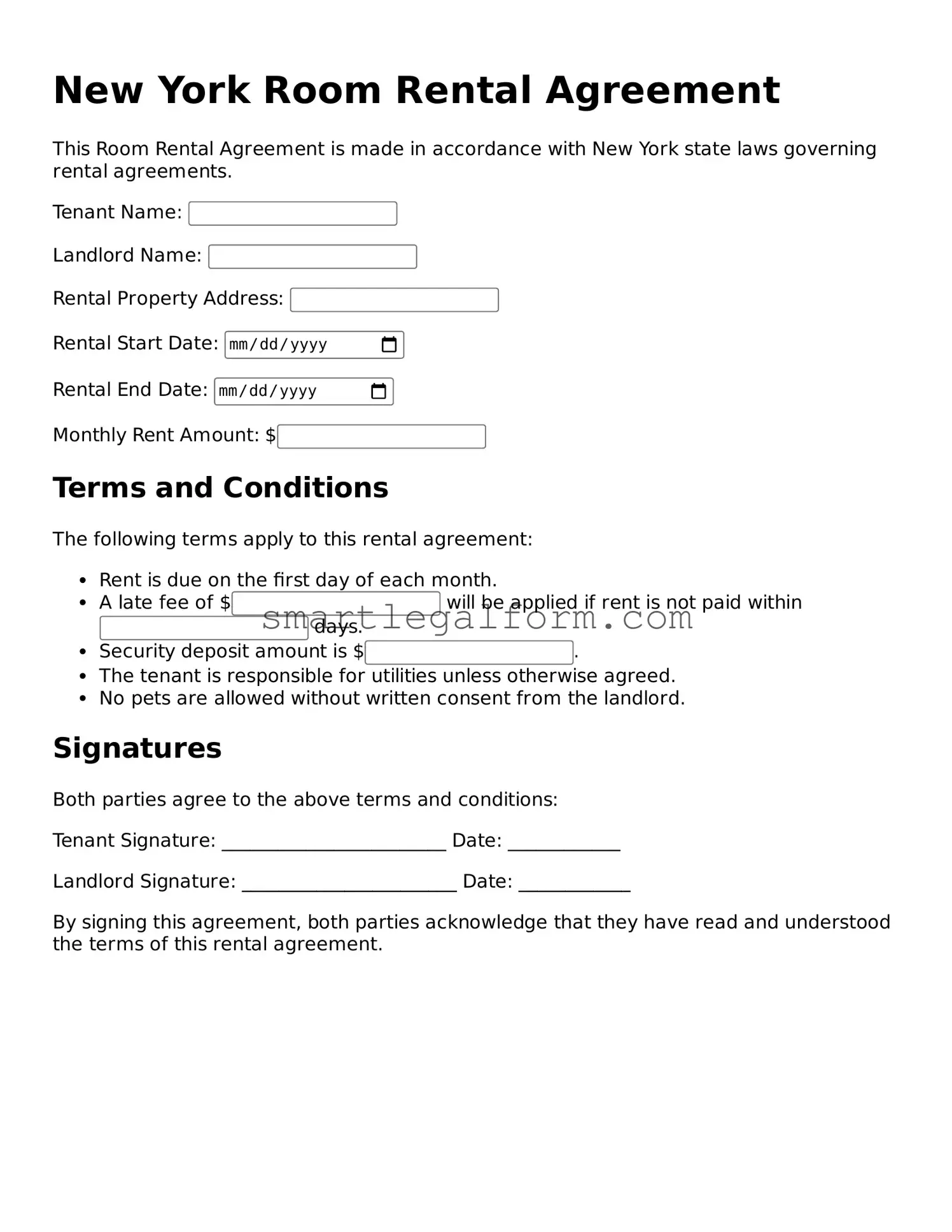Printable New York Room Rental Agreement Document
Form Preview Example
New York Room Rental Agreement
This Room Rental Agreement is made in accordance with New York state laws governing rental agreements.
Tenant Name:
Landlord Name:
Rental Property Address:
Rental Start Date:
Rental End Date:
Monthly Rent Amount: $
Terms and Conditions
The following terms apply to this rental agreement:
- Rent is due on the first day of each month.
- A late fee of $ will be applied if rent is not paid within days.
- Security deposit amount is $.
- The tenant is responsible for utilities unless otherwise agreed.
- No pets are allowed without written consent from the landlord.
Signatures
Both parties agree to the above terms and conditions:
Tenant Signature: ________________________ Date: ____________
Landlord Signature: _______________________ Date: ____________
By signing this agreement, both parties acknowledge that they have read and understood the terms of this rental agreement.
Common mistakes
When entering into a Room Rental Agreement in New York, individuals often overlook critical details that can lead to misunderstandings or legal issues later on. One common mistake is failing to include the full names of all parties involved. This may seem trivial, but without clear identification, disputes can arise regarding who is responsible for the terms of the agreement.
Another frequent error is neglecting to specify the rental amount and payment terms. Clarity is essential; vague language can lead to confusion about when payments are due and how much is owed. It’s crucial to outline whether the rent includes utilities or if they will be billed separately.
People often forget to indicate the duration of the rental period. Whether it’s a month-to-month arrangement or a fixed-term lease, stating the length of the rental agreement helps both parties understand their obligations and rights. Without this information, tenants might assume they can stay indefinitely, while landlords may expect a timely turnover.
Many individuals also fail to document any security deposit arrangements. This can lead to disputes over the return of the deposit at the end of the rental period. Clearly stating the amount of the deposit and the conditions under which it will be returned protects both the landlord and the tenant.
Inadequate descriptions of the property itself can create problems. The agreement should include the address, unit number, and any specific details about the space being rented. This helps avoid confusion about what is included in the rental and ensures that all parties are on the same page.
Another mistake is not addressing maintenance responsibilities. Who is responsible for repairs? If the agreement does not clarify this, it could lead to conflicts down the line. Both landlords and tenants should understand their obligations to maintain the property.
Additionally, many overlook the importance of including rules regarding pets. If a landlord has a no-pet policy, it should be clearly stated in the agreement. Conversely, if pets are allowed, outlining any restrictions or additional fees is equally important to avoid misunderstandings.
Lastly, failing to include a termination clause is a significant oversight. This clause should detail how either party can terminate the agreement, including the required notice period. Without this information, tenants may feel trapped, while landlords might find themselves unable to reclaim their property when needed.
Dos and Don'ts
When filling out the New York Room Rental Agreement form, attention to detail is crucial. Here are some essential dos and don'ts to consider.
- Do read the entire agreement carefully before signing.
- Do provide accurate personal information, including your full name and contact details.
- Do clarify any terms or conditions you do not understand with the landlord.
- Do ensure the rental amount and payment terms are clearly stated.
- Don't rush through the form; take your time to avoid mistakes.
- Don't leave any sections blank unless instructed to do so.
- Don't ignore any additional fees or deposits mentioned in the agreement.
Following these guidelines will help ensure a smoother rental process and protect your rights as a tenant.
Other Room Rental Agreement State Forms
Roommate Agreement Pdf - The contract may include details on how to handle various situations, like damage or loss of property.
Understanding the importance of a Florida Durable Power of Attorney form is crucial for anyone looking to secure their financial dealings. It not only empowers an agent to act on behalf of the principal but also provides peace of mind knowing that in the event of incapacitation, their financial matters will be handled with care. For more detailed information, you can visit TopTemplates.info.
Similar forms
-
Lease Agreement: This is a more comprehensive document that outlines the terms of renting an entire property, rather than just a room. It typically includes details about the length of the rental, rent amount, and responsibilities of both the landlord and tenant.
- Prenuptial Agreement: Before entering a marriage, couples can utilize the essential prenuptial agreement guidelines to clearly define asset distribution and responsibilities, ensuring a transparent future.
-
Sublease Agreement: Similar to a Room Rental Agreement, a sublease allows a tenant to rent out part or all of their rented space to another person. It outlines the terms and conditions under which the subtenant can occupy the space.
-
Roommate Agreement: This document is used between individuals sharing a rental space. It covers shared responsibilities, payment of rent and utilities, and other house rules, ensuring everyone is on the same page.
-
Rental Application: While not an agreement, this document is often completed by potential tenants to provide information to landlords. It helps landlords assess the suitability of applicants before entering into any rental agreement.
-
Notice to Quit: This document is used when a landlord needs to inform a tenant that they must vacate the property. It is similar in that it deals with rental terms, but it focuses on ending the rental relationship rather than establishing it.
